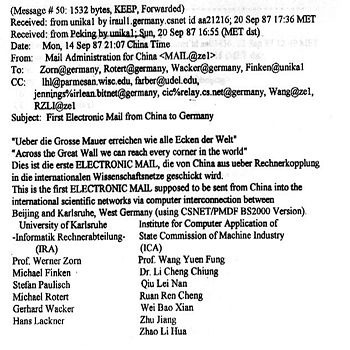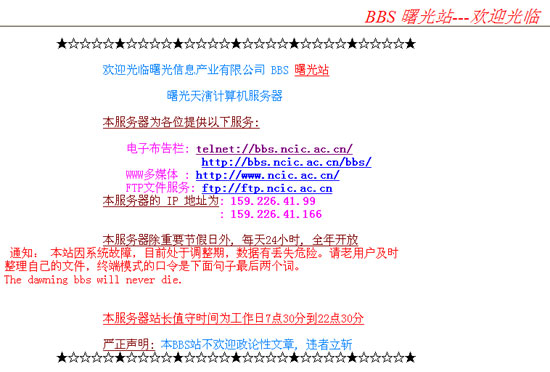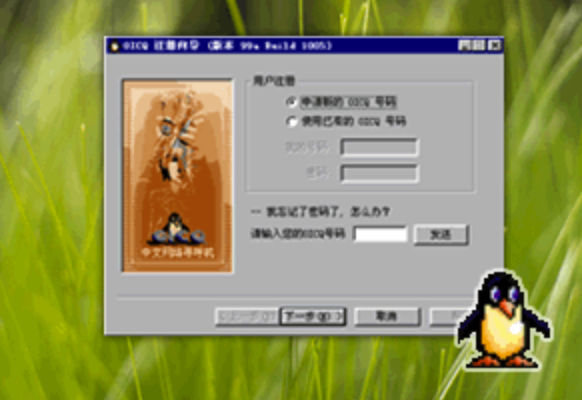06:10

In the past two decades, the way Chinese people communicate has been reshaped entirely by the internet. The development of communication tools, such as email, instant messaging software and apps, has also spurred the economic growth.
It is now typical to see people texting everywhere, whether on subways and buses, on foot or escalators.
In this digital era, we tend to use our fingers much more often than our mouths to communicate with each other.
This change can be traced back to 32 years ago.

China's first email was sent to Germany. /CGTN Photo
China's first email was sent to Germany. /CGTN Photo
On September 14, 1987, a researcher in Beijing sent China's first e-mail, to Germany. But the message didn't arrive the destination until six days later.
In April 1994, China was officially connected to the internet, facilitating email communication with North America and Europe.
One month later, China's first online forum was born. BBS, a primary form of online forums, quickly attracted tens of thousands of Chinese.

China's first BBS, or Bulletin Board System, Shuguang BBS. /CGTN Photo
China's first BBS, or Bulletin Board System, Shuguang BBS. /CGTN Photo
Five years later, in 1999, Pony Ma developed OICQ, later renamed as QQ, with its penguin icon that almost every Chinese knows.

In February, 1999, Tencent launched China's first online chatting software, OICQ. /CGTN Photo
In February, 1999, Tencent launched China's first online chatting software, OICQ. /CGTN Photo
Dylan Li, 33, was among the first people in China to use the internet and chat online.
He still remembers the crazy time when he first did so. "In 1997 or 1998, it was my first time using an online chatroom. Then half or a year later, I started to use OICQ. You don't know who you were talking to, and actually, there was not too much content in talking, but it was crazy that I could chat for a whole night."
For young people at that time, online chatting became a new way to find romantic partners. Guan Quansheng, 34, now an associate professor at the South China University of Technology, said many of his college classmates were crazy about the internet in the early 2000s.
"At that time, we were fascinated by the fact that you could talk to different strangers online. Boys and girls found each other in chatrooms or on QQ. And some romance or sparks could even occur," he said.
In the first decade of the new century, lots of companies like Microsoft, China Mobile, and Baidu all tried to challenge the dominance of QQ in China's instant messaging market. But they all failed.
In 2000, the peak number of concurrent QQ users surpassed 100,000. In 2014, the number surged 2,000 times to 200 million. It's like putting all people in the UK and Mexico online talking to each other.
Dylan told CGTN that for the post-80s generation, a QQ account is a significant number like an ID card number and a cellphone number. "It's like our digital ID," he added.
WeChat phenomenon
But soon, the era of the mobile internet came. In 2011, WeChat was born.
Now nearly 1.1 billion active WeChat users send about 45 billion messages every day. Over the past eight years, WeChat has built an empire, providing services from basic messaging to mobile payment to e-commerce and gaming.
Now over one billion transactions are made on WeChat Pay daily.
And as adults stay longer and longer on WeChat, the younger generation born after 2000 is gradually returning to QQ.
According to Zhang Hao, deputy general manager of the Social Platform Products Department of Tencent, QQ now has about 800 million monthly active users, 700 million of whom are on smartphones.
"And many of them are young people under the age of 21. We had a 13 percent year-on-year growth of monthly active users under the age of 21, according to Tencent's 2018 fourth-quarter results."
Talking about the future, Zhang believes 5G will be a game-changer. "The arrival of 5G means a rapid decline in telecom price packets and a surge in internet bandwidth. So video chatting or video social platforms will mean big business, and we've put lots of resources in this area."
China's post-80s and post-90s youths have been shaped by the explosive internet breakout. Now, it's their turn to shape the future for the next generations.